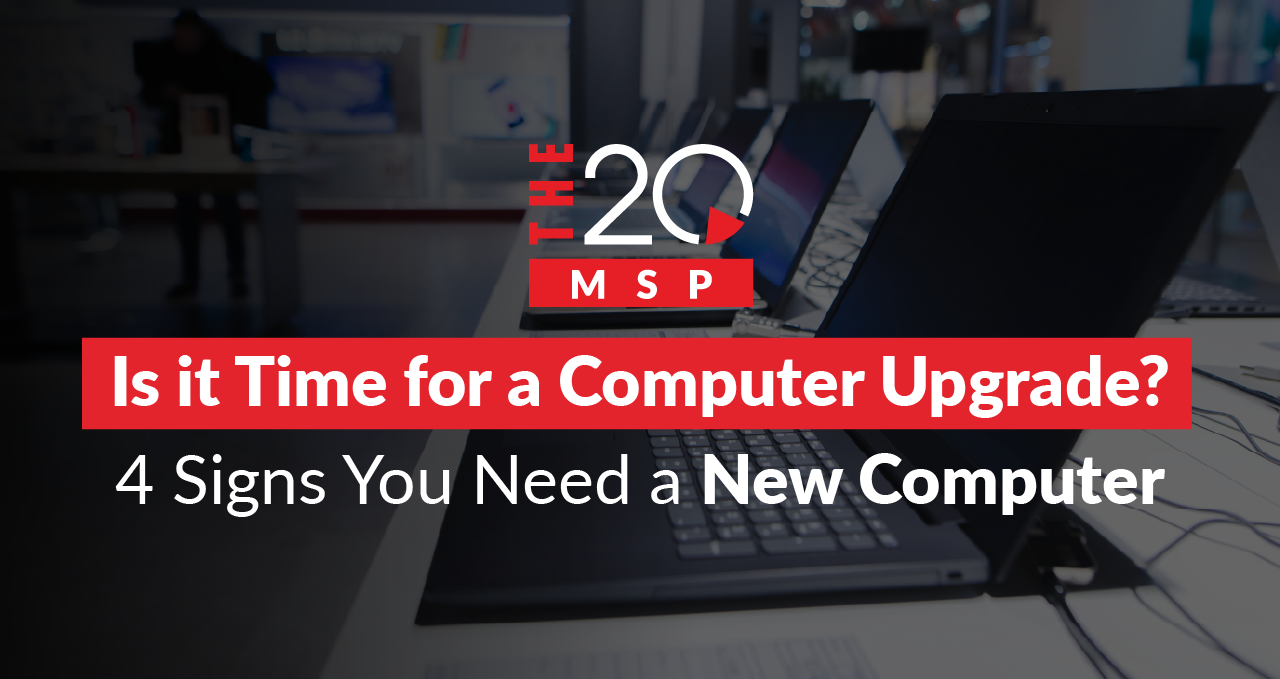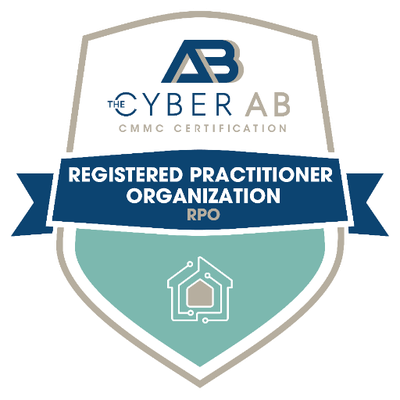
Is It Time for a Computer Upgrade? 4 Signs You Need a New Computer
It’s a big question.
On one hand, a computer upgrade isn’t a simple plug-and-play – it takes research, time, and, let’s be honest, money. On the other hand, limping along with an outdated, failing system isn’t just frustrating – it can lead to serious problems down the line.
At the end of the day, one simple truth remains:
Computers don’t last forever.
But when exactly should you upgrade? And just as importantly, how do you manage upgrades across an entire business without causing chaos?
Let’s dive in.
Why You Should Upgrade Your Computers
Hardware ages, and when it does, problems follow (we’ll get to those problems in a minute). In the tech world, we call outdated machines legacy systems – and they’re bad news. In fact, according to CIO Dive, upgrading legacy systems cost businesses an average of $2.9 million in 2023.
Sure, it’s obvious when a machine completely dies that it’s time for a replacement. But ideally, you want to upgrade before things get that far.
Pushing a computer past its limits risks shutdowns, software corruption, and hardware failures – all of which can cause data loss and work interruptions. And downtime? It’s expensive.
Then there’s security. Old machines may lack up-to-date security features and patches, making it easier for cybercriminals to breach outdated systems, steal credentials, and deploy ransomware.
Knowing when you need a computer upgrade is key to keeping your business productive and secure.
Here are six major signs to watch out for.
1. Your Computer Is Too Old
Here’s an easy question: How old is your system?
Most business computers have a lifespan of three to eight years. But if you’re still hanging on at year eight, you’re already too late.
Even if your machine still turns on, aging hardware becomes more vulnerable to failures, security issues, and sudden crashes. We recommend replacing your systems every three to five years to avoid costly surprises and lost productivity.
2. New Software Isn’t Functioning Properly
Struggling to install a Windows update? Getting error messages every time you start an important app? That’s a warning sign that you need a computer upgrade.
Modern software demands modern hardware. When your system can’t handle updates, it puts your security, compliance, and ability to simply work at risk.
It’s not just about one app failing – it’s a sign that everything else could start breaking down.
3. Worsening Performance
If your computer feels slower by the week, it’s time to start thinking about a computer upgrade.
Freezing programs, long startups, and slow performance add up fast. Sure, your machine might technically work, but how much time (and money) are you losing while waiting for it to catch up?
4. Strange Noises
If your computer starts buzzing, beeping, or sounding like it’s ready for liftoff, something’s failing. If one part’s going, the rest probably aren’t far behind. But before you rush to repair it, you might want to consider the bigger picture…
5. Repairs Are Getting Expensive
Just because you can repair it doesn’t mean you should.
Outdated parts often cost more than they did when they were new. Why? Because they’re no longer manufactured, and refurbished parts on third-party marketplaces (like eBay) come at a premium.
In many cases, it’s cheaper and more efficient to fully upgrade your computer rather than patching it up like Frankenstein’s monster.
6. Your Team’s Needs Have Changed
Your hardware should keep pace with how your team works.
According to a survey by TechTarget, 72% of all respondents believe they’re held back by their outdated computers – relying too heavily on outdated hardware and software.
As remote work, hybrid schedules, cloud software, and video conferencing become the norm, aging computers simply can’t keep up.
If your team struggles to run video calls, work apps, or modern tools like Teams, Slack or large cloud files without lag, it’s time for an upgrade.
The Truth: Don’t Wait for the Signs
Here’s the kicker: Ideally, you won’t see any of these signs. Yes, performance naturally degrades over time, but the best time to replace your computer is before you start facing major issues.
That’s why every business should practice rolling upgrade cycles – replacing systems every few years – as this helps avoid sudden failures and security gaps.
But managing that? Especially across a fleet of 7-10 (or more) computers? It’s a lot for one manager or IT team to juggle. Which brings us to…
Using an MSP: The Who, What, When, Where, and Why of Computer Upgrades
Upgrading a single system? Easy. Upgrading an entire business? That’s where a Managed Service Provider (MSP) comes in.
MSPs are built to help small to medium-sized businesses like yours handle upgrades. Here’s how:
Who Needs an Upgrade?
Many MSPs keep detailed records using monitoring tools and hardware tracking. With this inventory, they can flag which employees are dealing with outdated hardware and who can benefit from higher-performance systems based on their role.
For example, your accounting department will likely need a different computer upgrade than your creative or engineering teams.
What Will They Upgrade to?
A good MSP will recommend hardware that fits your needs – not overkill, not underpowered. And in a market saturated with literally thousands of options, having expert guidance to navigate them isn’t just nice – it’s necessary.
By assessing your team’s work, what software they use, and how much performance is required, an MSP will recommend the best computer upgrade within your budget.
From there, they can order your hardware – often with vendor discounts – and handle pre-configuration tasks like installing business-critical apps and security settings before the computers even arrive at your office.
When Will They Upgrade?
Timing is everything. By working outside peak hours to avoid interruptions, MSPs don’t just help you decide what to upgrade – they help you decide when.
This is critical because a computer upgrade, while not the longest task, still takes time – and things don’t always go as planned. By working with an MSP, you avoid the potential issues that would otherwise disrupt your day.
This might mean upgrading a few systems each quarter, replacing entire departments annually, or swapping out computers during slower business periods.
Many MSPs can map out your upgrade path years in advance, giving you budget predictability and peace of mind.
Where Will Upgrades Happen?
In many cases, MSPs can perform your computer upgrade right at your office, but some also offer remote or hybrid deployment options. This is when a new computer is shipped directly to an employee and set up with the help of a technician online – no in-person visit needed.
Wherever your team is located, your MSP will make sure your upgrade happens smoothly.
Why Is an Upgrade Needed?
It’s not just about age – it’s about performance, security, and your business’s ability to grow.
A good MSP looks at the whole picture: Are there recurring hardware issues? Is a department outgrowing its systems? Are there security gaps that could put your data at risk?
By answering the why, an MSP turns upgrades from a reactive chore into a smart, strategic move that supports your long-term goals.
Don’t Wait – Start Planning Today
Don’t wait until your computers kick the bucket. By the time a system powers off for good, you’ve already been dealing with lost productivity, potential data loss, and expensive downtime.
That’s why a proactive computer upgrade plan is so important. Knowing what you’ll need, when you’ll need it, and how to roll out upgrades keeps your business moving forward – without the last-minute scrambles.
And if it all sounds like a lot to handle… that’s because it is.
At The 20 MSP, we help small to medium-sized businesses like yours build smart, forward-thinking upgrade plans. From evaluating your current setup to deploying new systems with zero disruption, we handle the heavy lifting so you can stay focused on growing your business.
Upgrading your business’s computers is a big job – don’t do it alone.
About The 20 MSP
As a leading provider of managed IT services, The 20 MSP serves thousands of businesses nationwide, including single and multi-location organizations, delivering white-glove service, secure and streamlined IT infrastructure, and 24/7/365 support. We believe in building lasting relationships with clients founded on trust, communication, and the delivery of high-value services for a fair and predictable price. Our client’s success is our success, and we are committed to helping each and every organization we serve leverage technology to secure a competitive advantage and achieve new growth.





